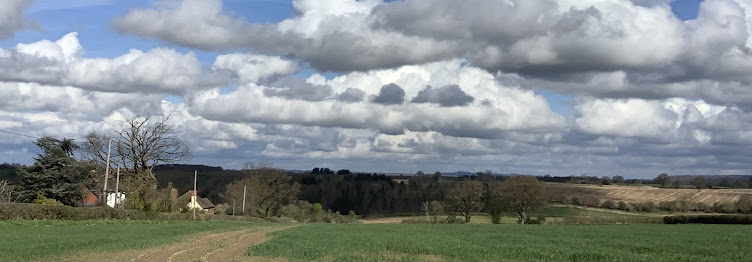 |
| English Bridge, seen leading out of Shrewsbury |
It has been, in its time, part of Wales and then part of England. Originally, it was thought to be the capital of the Welsh kingdom of Powys, and was called Pengwern (meaning ‘hill of alders’ or ‘swamp’ in Welsh), before being annexed in the late 8th century by the Anglo-Saxon kingdom of Mercia and becoming English. Situated so near to the Welsh border, it was a valuable asset to both sides, particularly when these two countries were at war in the 13th - 15th centuries. Well placed for trade, with a thriving population and large working Abbey, it had excellent defences and all round access for barges and boats.
 |
| The River Severn seen from English Bridge |
Occasionally I am at work for a whole day, and as I am near one of the two major bridges which go in and out of Shrewsbury (there is one on either sides of town, the other being Welsh Bridge), I like to wander down in my lunch break to admire the river at English Bridge. (Locally it is always called ‘English Bridge’, not ‘the English Bridge’). It looks beautiful all year round, but especially when it is flowing so gently that it barely seems to move and the surface reflects a soft mirror image of the river bank.
 |
| Towards Coleham from English Bridge |
On a still, autumn day in the 21st century, the town is still active and busy, but the transport is now motor vehicles and the trade is very much the same as other medium sized English towns. Although there is, thankfully, no longer a McDonald’s in the centre - you have to drive to the outskirts for that. Better still, visit one of the many independent eateries or smaller food chains, and support a local business.
 |
| Barracks Passage, leading to the Henry Tudor Inn, parts dating back to the 1420s |
The other day I popped in to the town centre, to visit Music Bros. and look at the acoustic guitars; I don’t need a new guitar, and I certainly can’t afford one, but it is a very gentle and enjoyable form of window shopping. I bought a couple of new plectrums and chatted to the nice young man at the counter about thumb picks and the growing popularity for narrower guitar necks.
Returning to work, I was struck, as always by the sheer variety of old and new architecture; at head height, Shrewsbury seems to be a fairly standard commercial town. But look up, and history reveals itself in the pleasingly jumbled architecture of shop fronts and roofs.
 |
| An opticians, below a early 16th century timber framed building |
 |
| Circa 16th century, originally a dwelling |
 |
| High Street, dating back to 1709, with older building parts incorporated |
 |
| Costa Coffee underneath a grade 11 c1575 building (previously the Cross Keys Inn) on the corner of Grope Lane |
My walk back to the office took me through Wyle Cop, starting with this gorgeous side view of a lozenge brick and timber frame. Once a house, this structure has its origins in the late 16th century (1500s) with later additions.
My final stretch of the journey and leading back to English Bridge; Wyle Cop, a large jewel in the crown of Shrewsbury. It is an ancient thoroughfare lined with small half timbered shops and pubs, which is the southern entrance road into the town, as it has been for hundreds of years. This stretch of road, less than half a mile long, boasts 39 listed buildings, many of them dating from the 15th and 16th century. In keeping with the rest of Shrewsbury, it is very much alive and working, despite being steeped in so much history. It is said to be the longest stretch of independent shops and businesses in the U.K.
 |
| The ‘top of the Cop’ leading back down to English Bridge and out of town. |
It’s difficult to imagine the sheer amount of conflict, politics and bloodshed this modest and picturesque town has seen over the years. A resident from the Middle Ages would be astounded to see it today, still thriving, despite financially hard times and now a popular tourist destination. The River Severn has seen it all and continues to flow 220 miles from Mid-Wales to its final destination, the Bristol Channel and eventually, to the sea and the world beyond.






1 comment:
Oh how I miss Shrewsbury it is where my in-laws lived and my DH for a while in his teens. My favourite place to eat was The Good Life and I just loved the many independent shops. Thank you for such lovely pictures, they have brought back memories of happy times when we visited for a weekend.
Post a Comment